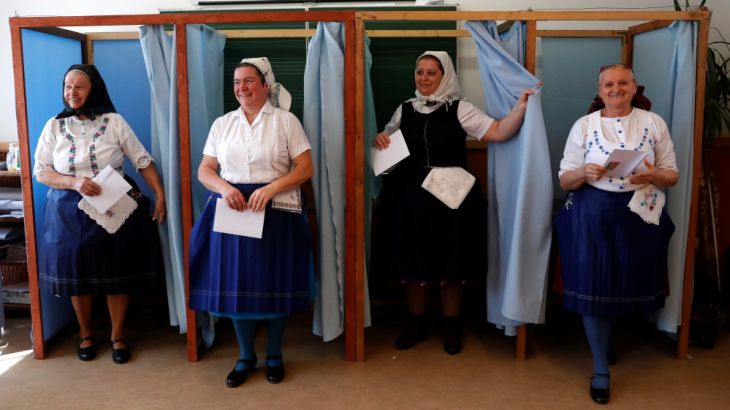Hungary elections: Prime Minister Viktor Orban declares victory
Orban set for third successive term in power after campaign targeting refugees and migrants wins large majority.

Hungarian Prime Minister Viktor Orban had declared victory after preliminary results show his anti-migrant party is projected to win a commanding majority in the country’s key parliamentary elections.
With more than 93 percent of the votes in Sunday’s poll counted, Orban’s increasingly far-right Fidesz party was in first with nearly half the vote, the National Election Office said.
The result is expected to hand Orban a third successive term in power.
Orban’s nearest rival was Gabor Vona, of Jobbik party, with 20 percent. The Socialists, led by Gergely Karacsony was third, with 12 percent of the vote.
Turnout stood at 68.80 percent, higher than the final turnout of 61.73 percent in the last election in 2014, which gave Orban a landslide victory.
“Dear friends, there’s a big battle behind us, we secured a historic victory – we got a chance, we created a chance for us to protect Hungary,” Orban told a crowd of cheering supporters in the capital, Budapest on Sunday evening.
“The high voter turnout puts every doubt into brackets,” he added.
Following his election defeat, Vona, chairman of Jobbik, tendered his resignation.
The Socialists leaders also resigned, saying: “We regard ourselves responsible for what happened, [and] we have acknowledged the decision of voters”.
Jonah Hull, reporting from Budapest, said Orban’s election victory result was “the fruition of a particularly nasty” and “hate-based, xenophobic campaign”.
“It has basically been a single-issue campaign, based on the spectrum of the ‘invading hordes of Muslim refugees’ being held back by a fence that he’s built on the southern border,” said Hull.
“He paints himself as a sort of saviour of Hungary from the refugees.”
Noting that the main opposition party in Hungary was Jobbik, “a formerly – until very recently – staunchly far-right, anti-immigrant party with neo-Nazi roots”, Hull said that “the era of populist, staunchly right-wing nationalism and xenophobia in the country is far from over”.
![Voting officially ended at 7pm (17:00 GMT) [Bernadett Szabo/Reuters]](/wp-content/uploads/2018/04/3d15c1d73ddc4083be34a1636f5e8aa7_18.jpeg)
With far-right and populist parties making gains in a spate of recent European elections, including in Italy and Austria, analysts have speculated that Orban’s anti-migrant and “illiberal” policies could have long-lasting implications for the European Union (EU).
Ahead of the vote, the prime minister had called on voters to “save Hungary”.
Orban’s campaign has focused largely on issues like migration and George Soros, the Hungarian American billionaire and philanthropist who Fidesz accuses of encouraging refugees to flood the central European country.
“This is a political strategy of the governing party,” Bulcsu Hunyadi, a senior analyst at the Political Capital Institute think-tank, told Al Jazeera.
“They think these are the only topics with which they can dominate the discussion.”
‘Conservative political tradition’
Matthew Goodwin, professor of politics and international relations at the University of Kent, said the “strong result” by Orban’s party would be “greeted by the populist right in Europe and also much of the centre-right who want to see Hungary, Poland, Austria and Italy pushing back against the EU on the big issue of the refugee crisis and push Europe in a more conservative direction.”
He added that earlier on Sunday there was speculation over a potential backlash against Orban’s policies given the high turnout figures, but the results showed that Fidesz had actually picked up more support in rural, non-urban areas.
“That’s part of a European trend, with populists, conservatives and ultra-conservative politicians doing very well outside of the big cities,” Goodwin told Al Jazeera.
“Orban himself really successfully tapped into what is a very conservative political tradition in Hungary,” he added, arguing that western European leaders such as French President Emmanuel Macron and German Chancellor Angela Merkel “continue to underestimate the strength of conservative currents in Eastern Europe”.